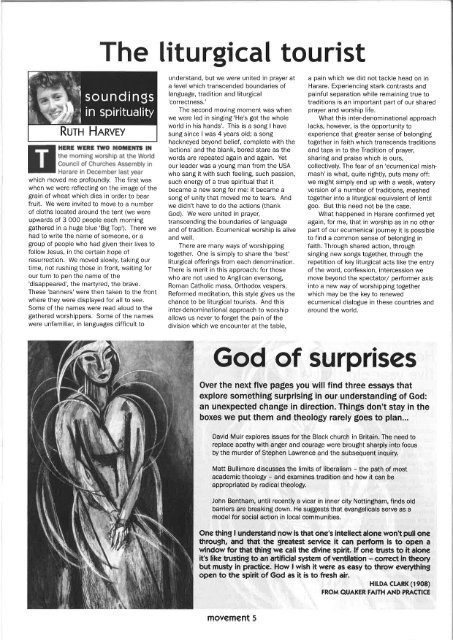Movement 102
You also want an ePaper? Increase the reach of your titles
YUMPU automatically turns print PDFs into web optimized ePapers that Google loves.
7<br />
I<br />
$l l;,ml:n;<br />
RurH Hnnvrv<br />
WERE TWO ilOTETIIS ITI<br />
the morning worship at the World<br />
Council of Churches Assembly in<br />
trHERE<br />
Harare in December last year<br />
which moved me profoundly. The first was<br />
when we were reflecting on the image of the<br />
grain of wheat which dies in order to bear<br />
fruit. We were invited to move to a number<br />
of cloths located around the tent (we were<br />
upwards of 3 000 people each morning<br />
gathered in a huge blue 'Big Top'). There we<br />
had to write the name of someone, or a<br />
group of people who had given their lives to<br />
follow Jesus, in the certain hope of<br />
resurrection. We moved slowly, taking our<br />
time, not rushing those in front, waiting for<br />
our turn to pen the name of the<br />
'disappeared', the martyred, the brave.<br />
These 'banners' were then taken to the front<br />
where they were displayed for all to see.<br />
Some of the names were read aloud to the<br />
gathered worshippers. Some of the names<br />
were unfamiliar, in languages difficult to<br />
The liturgical tourist<br />
understand, but we were united in prayer at<br />
a level which transcended boundaries of<br />
language, tradition and liturgical<br />
'correctness.'<br />
The second moving moment was when<br />
we were led in singing 'He's got the whole<br />
world in his hands'. This is a song I have<br />
sung since I was 4 years old; a song<br />
hackneyed beyond belief, complete with the<br />
'actions' and the blank, bored stare as the<br />
words are repeated again and again. Yet<br />
our leader was a young man from the USA<br />
who sang it with such feeling, such passion,<br />
such energy of a true spiritual that it<br />
became a new song for me: it became a<br />
song of unlty that moved me to tears. And<br />
we didn't have to do the actions (thank<br />
God). We were united in prayer,<br />
transcending the boundaries of language<br />
and of tradition. Ecumenical worship is alive<br />
and well.<br />
There are many ways of worshipping<br />
together. One is simply to share the 'best'<br />
liturgical offerings from each denomination.<br />
There is merit in this approach: for those<br />
who are not used to Anglican evensong,<br />
Roman Catholic mass, Orthodox vespers,<br />
Reformed meditation, this style gives us the<br />
chance to be liturgical tourists. And this<br />
inter-denominational approach to worship<br />
allows us never to forget the pain of the<br />
division which we encounter at the table,<br />
a pain which we did not tackle head on in<br />
Harare. Experiencing stark contrasts and<br />
painful separation while remaining true to<br />
traditions is an important part of our shared<br />
prayer and worship life.<br />
What this inter-denom inational approach<br />
lacks, however, is the opportunity to<br />
experience that greater sense of belonging<br />
together in faith which transcends traditions<br />
and taps in to the Tradition of prayer,<br />
sharing and praise which is ours,<br />
collectively. The fear of an 'ecumenical mishmash'<br />
is what, quite rightly, puts many off:<br />
we might simply end up with a weak, watery<br />
version of a number of traditions, meshed<br />
together into a liturgical equivalent of lentil<br />
goo. But this need not be the case.<br />
What happened in Harare confirmed yet<br />
again, for me, that in worship as in no other<br />
part of our ecumenical journey it is possible<br />
to find a common sense of belonging in<br />
faith. Through shared action, through<br />
singing new songs together, through the<br />
repetition of key liturgical acts like the entry<br />
of the word, confession, intercession we<br />
move beyond the spectator/ performer axis<br />
into a new way of worshipping together<br />
which may be the key to renewed<br />
ecumenical dialogue in these countries and<br />
around the world.<br />
God of surprises<br />
Over the next five pages you will find three essays that<br />
explore something surprising in our understanding of God:<br />
an unexpected change in direction. Things don't stay in the<br />
boxes we put them and theology rarely goes to plan...<br />
David Muir explores issues for the Black church in Britain. The need to<br />
replace apathy with anger and courage were brought sharply into focus<br />
by the murder of Stephen Lawrence and the subsequent inquiry.<br />
Matt Bullimore discusses the limits of liberalism - the path of most<br />
academic theolos/ - and examines tradition and how it can be<br />
appropriated by radical theolos/.<br />
John Bentham, until recently a vicar in inner city Nottingham, finds old<br />
barriers are breaking down. He suggests that evangelicals serve as a<br />
model for social action in local communities.<br />
One thing I underctand now is that one's intellect alone won't pull one<br />
through, and that the greatest seryice it can perform is to open a<br />
window for that thing we call the dMne spidt. lf one Eusts to it alone<br />
it's like trusting to an artificial system of vendlation - conect in theory<br />
but musty in practice. How I wish it were as easy to throw everything<br />
open to the spirit of God as it is to ftesh air.<br />
HrrDA CLARK (1908)<br />
FROM QUAKER FAITH AND PRACTICE<br />
movement 5
















